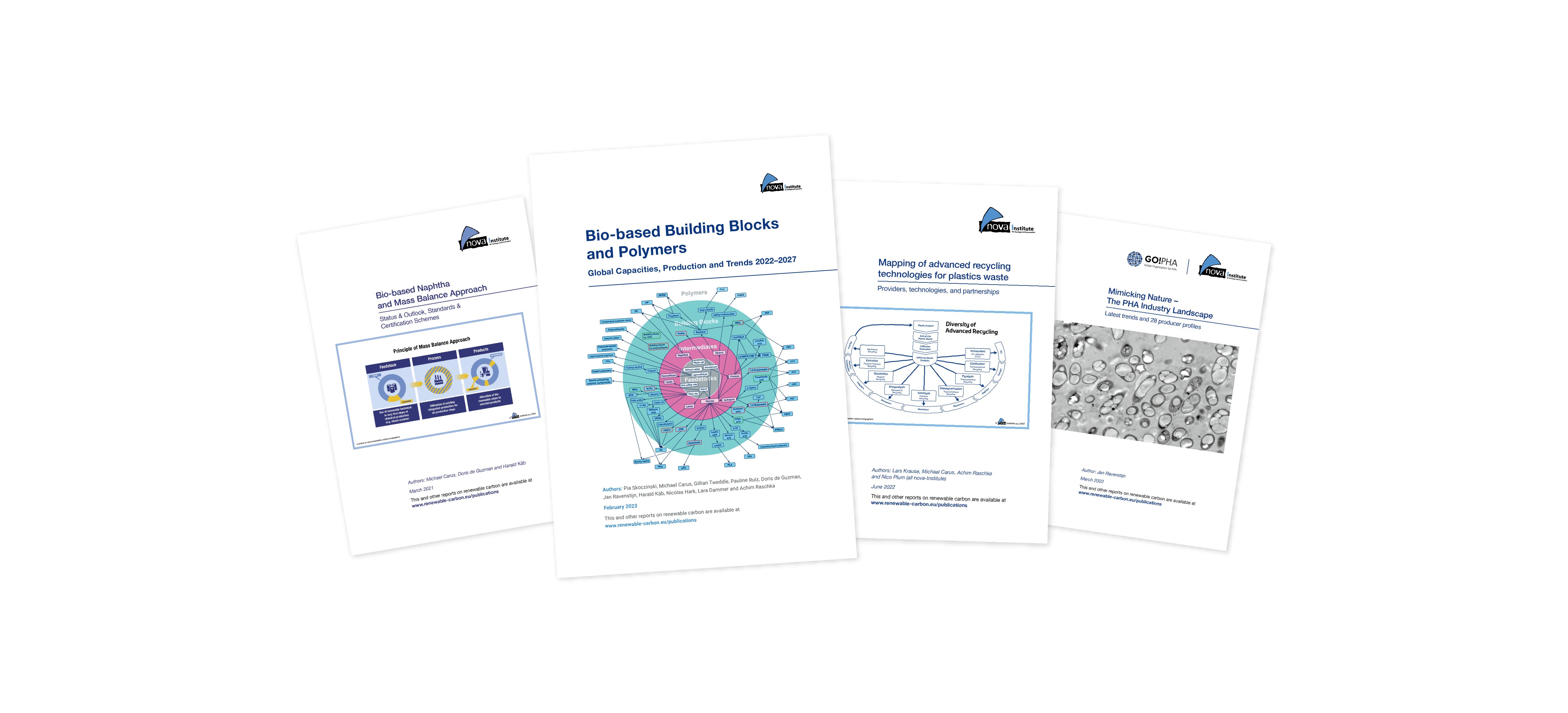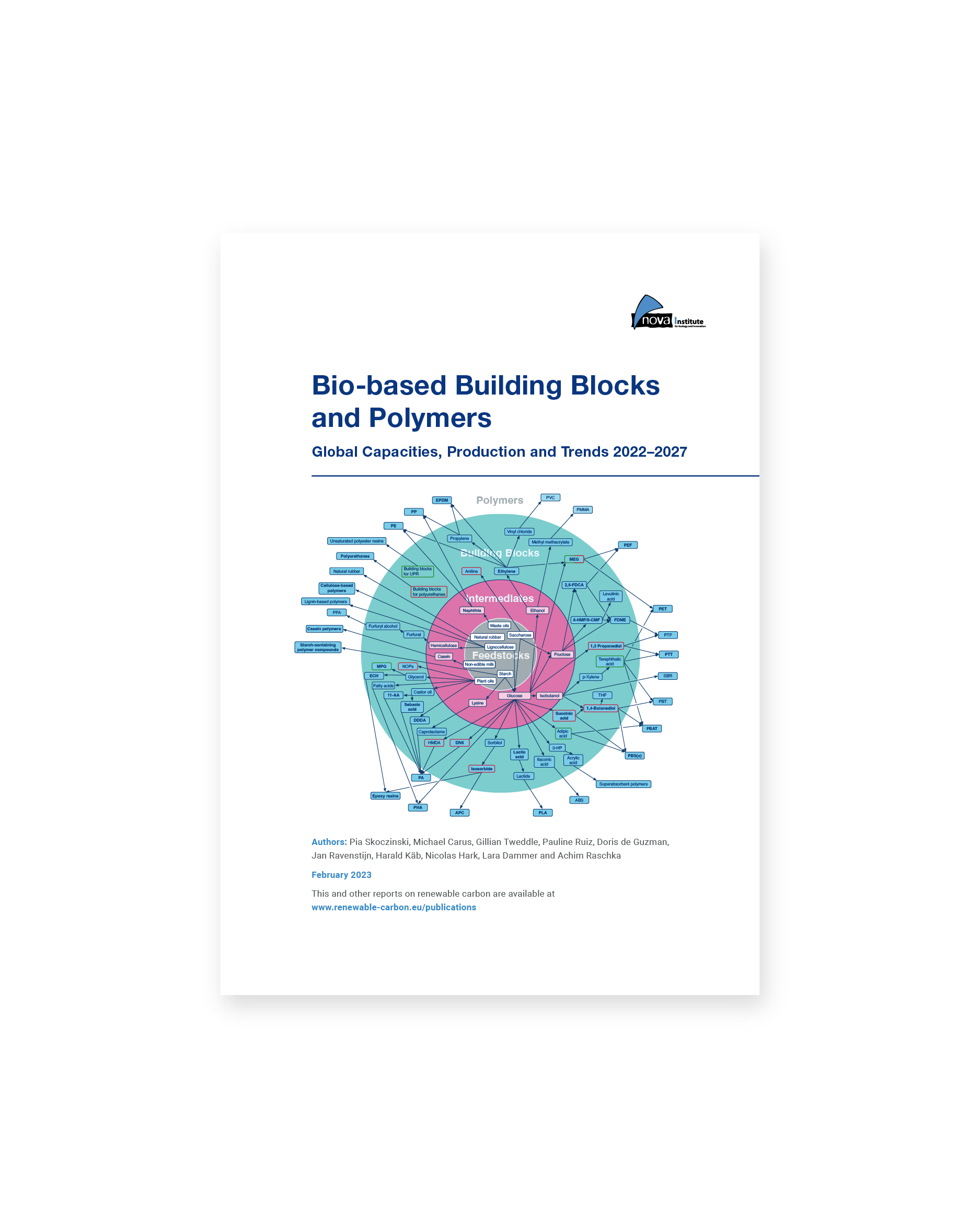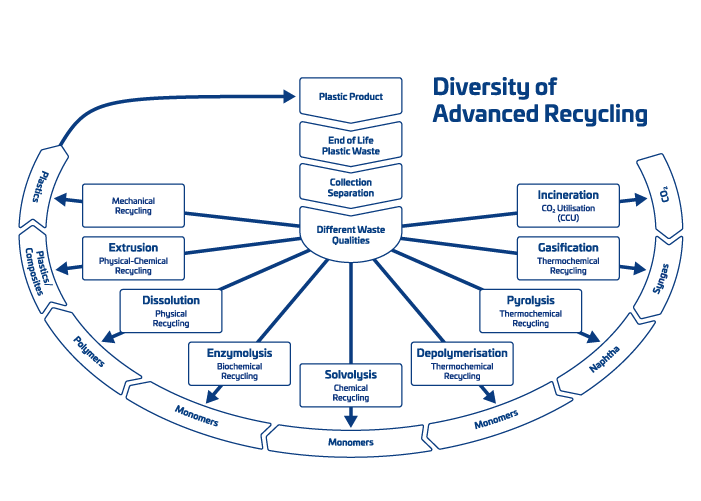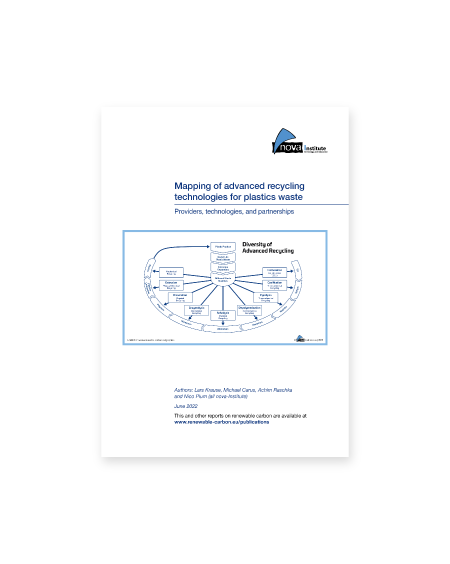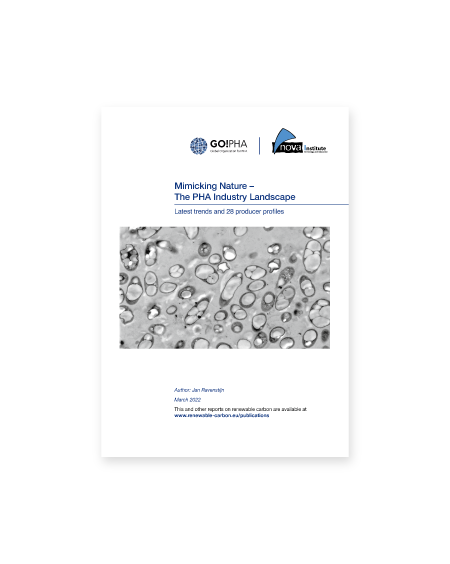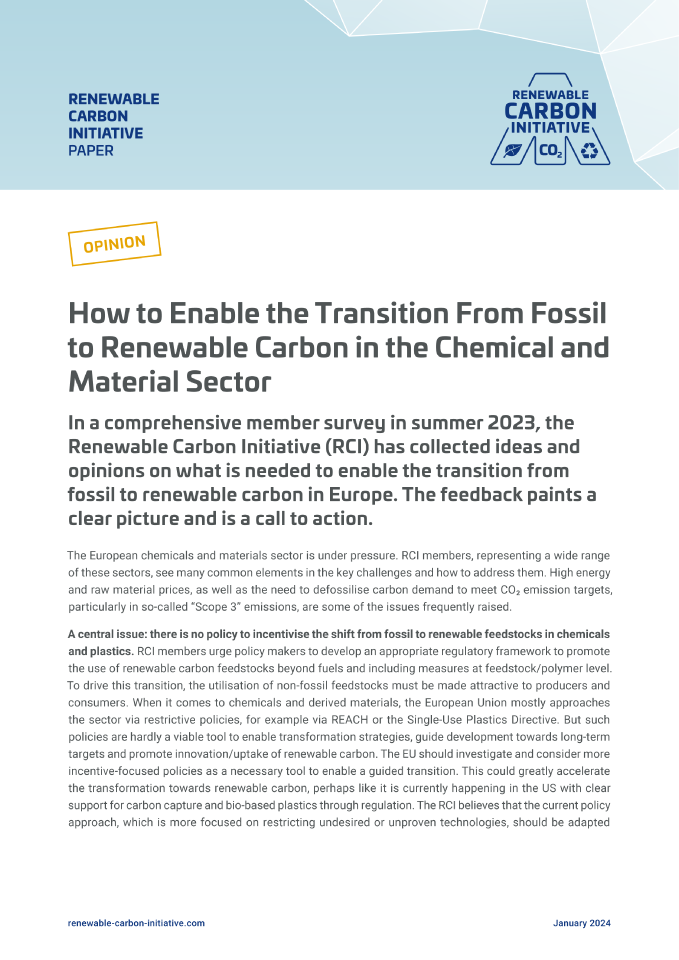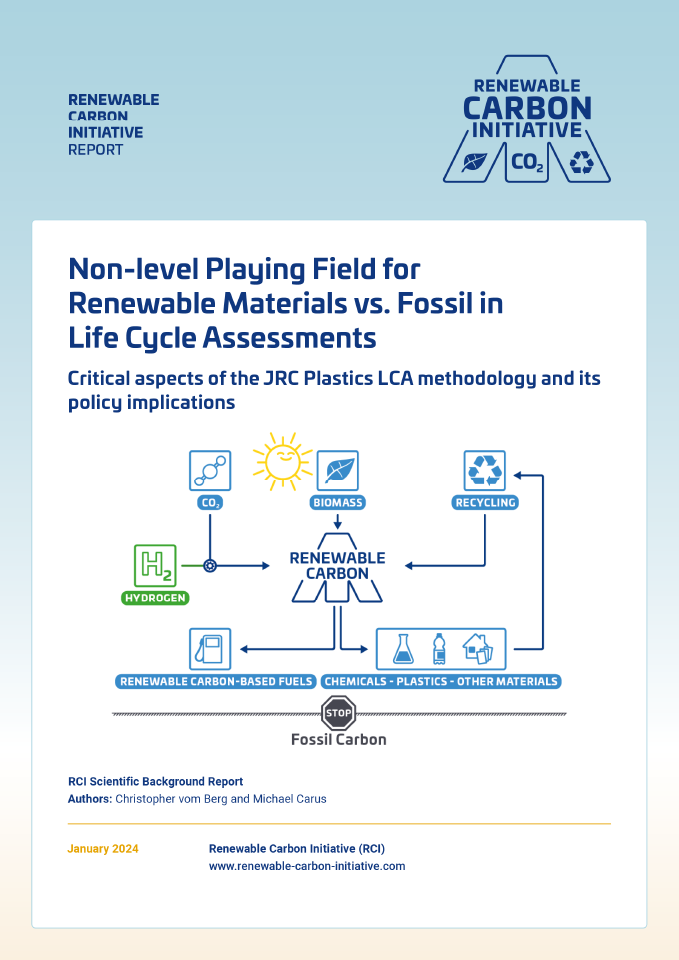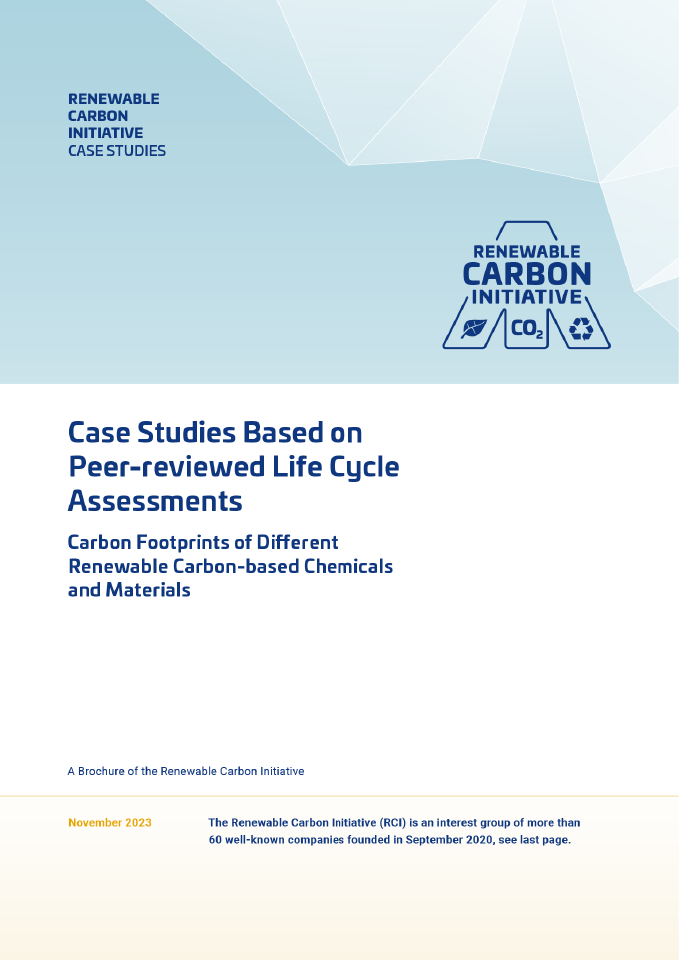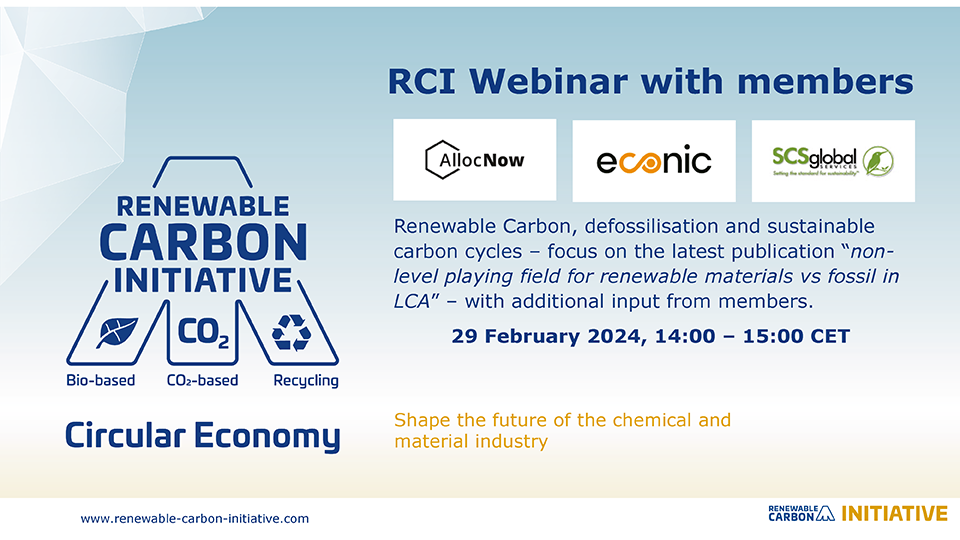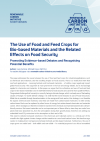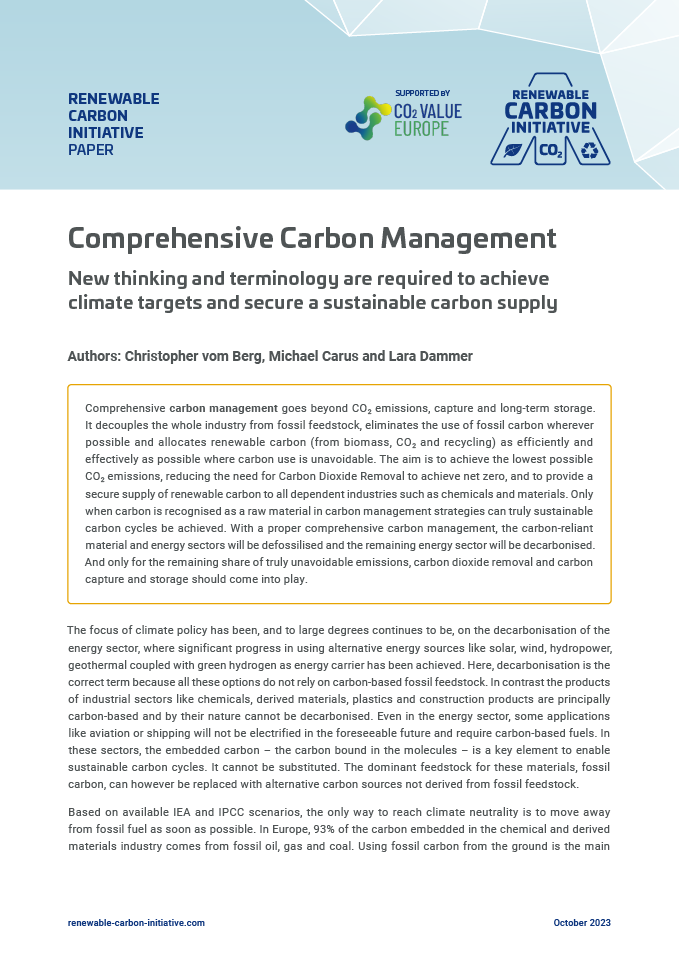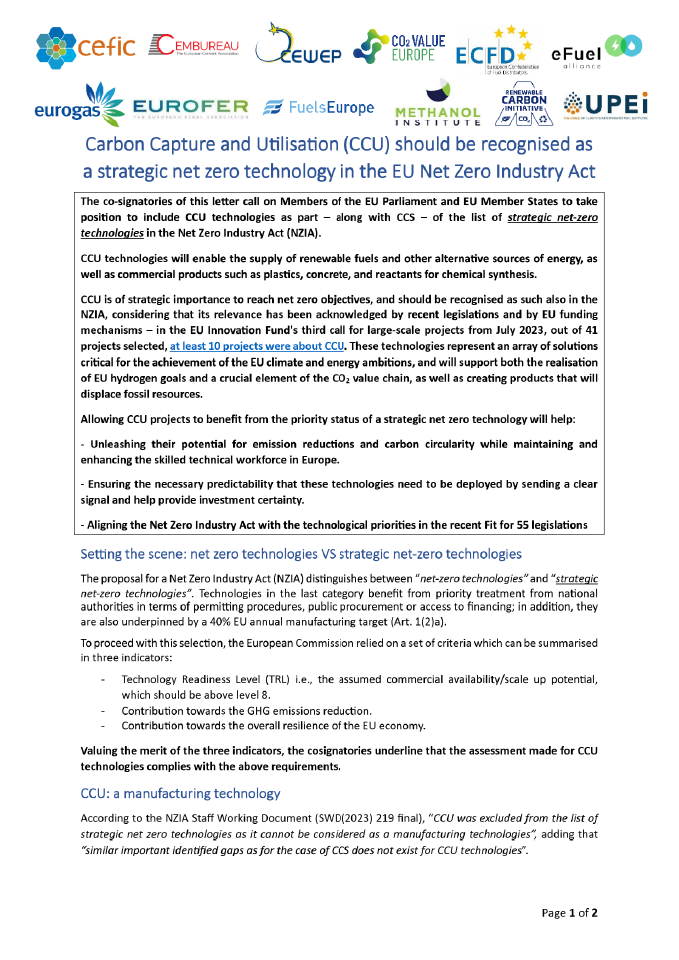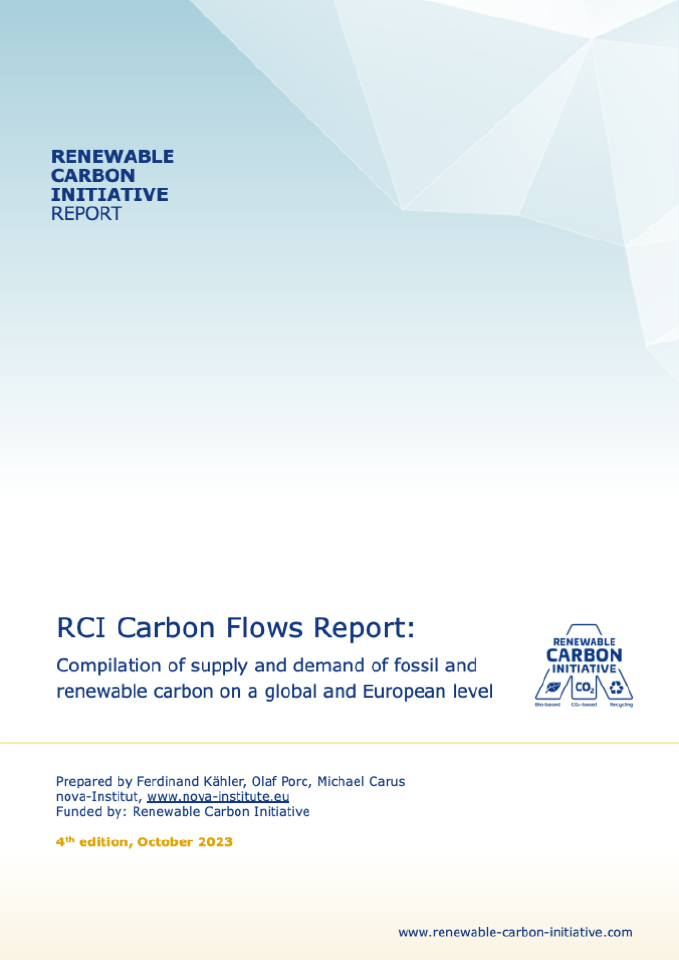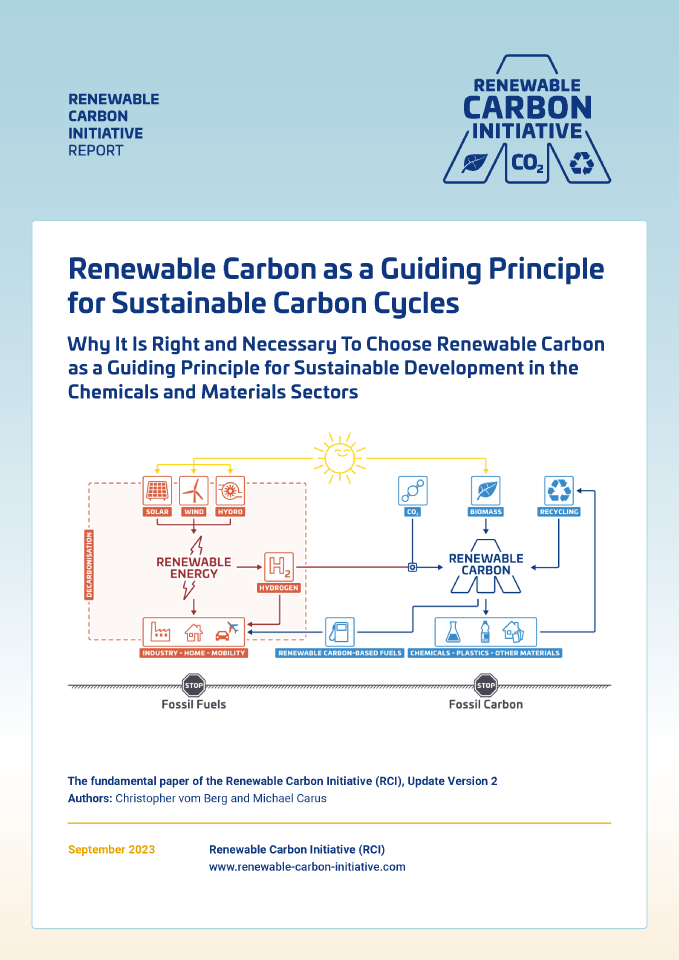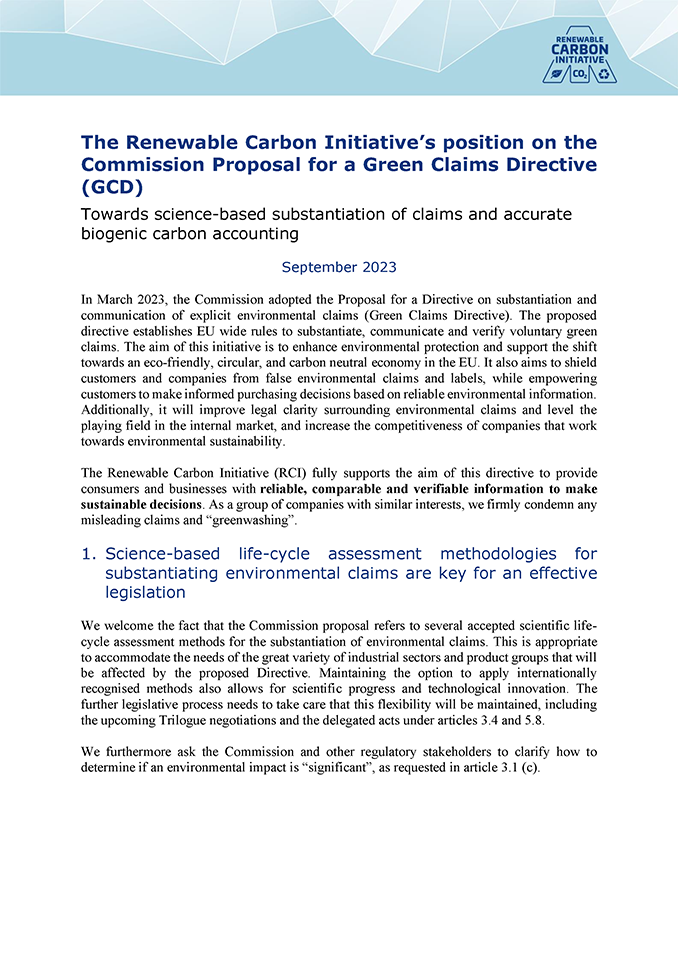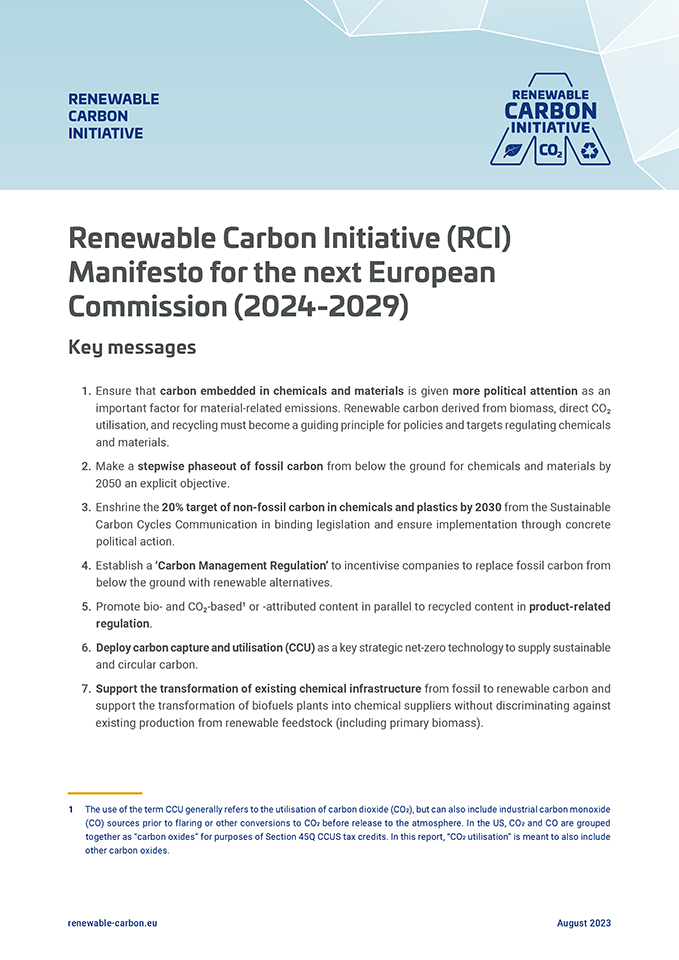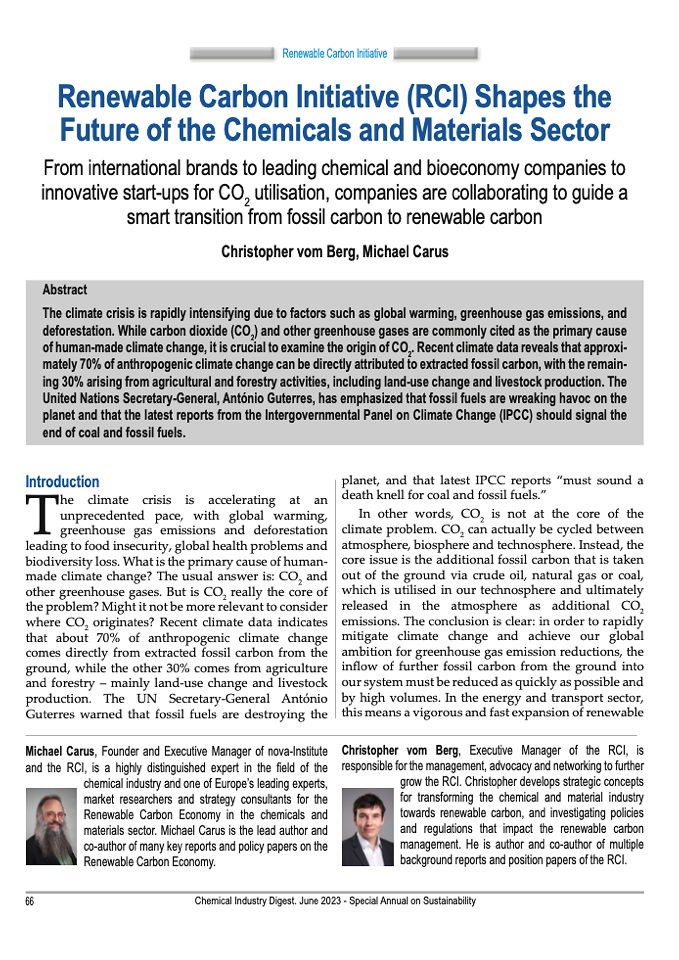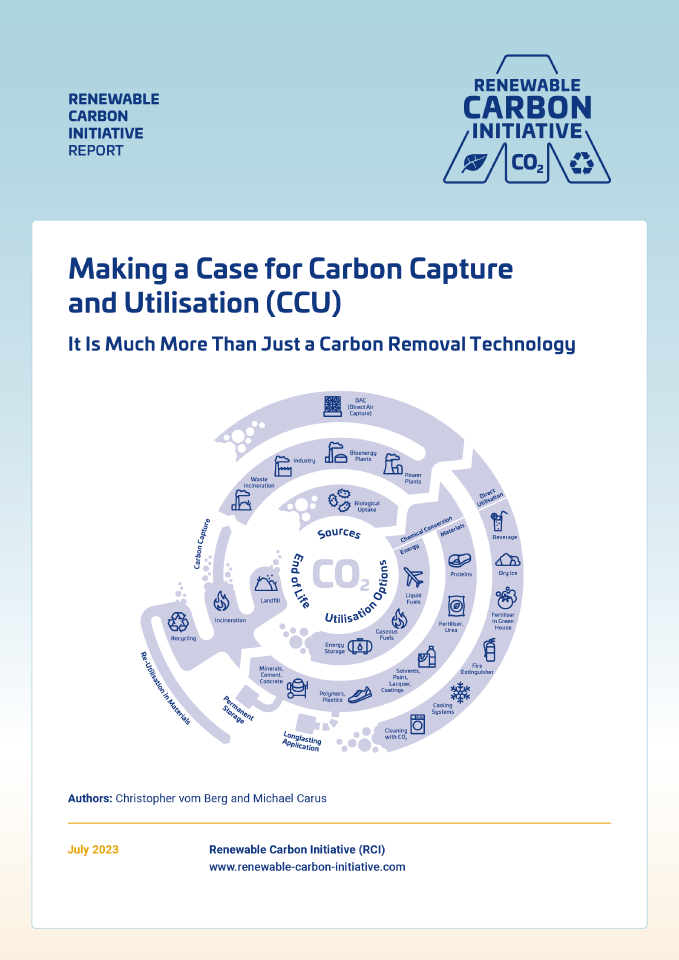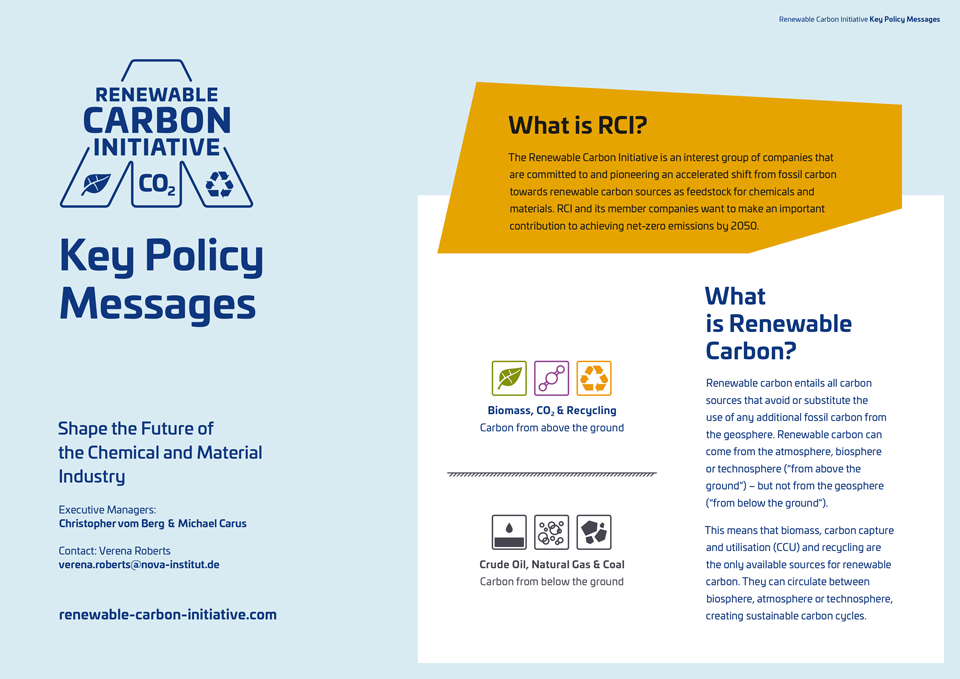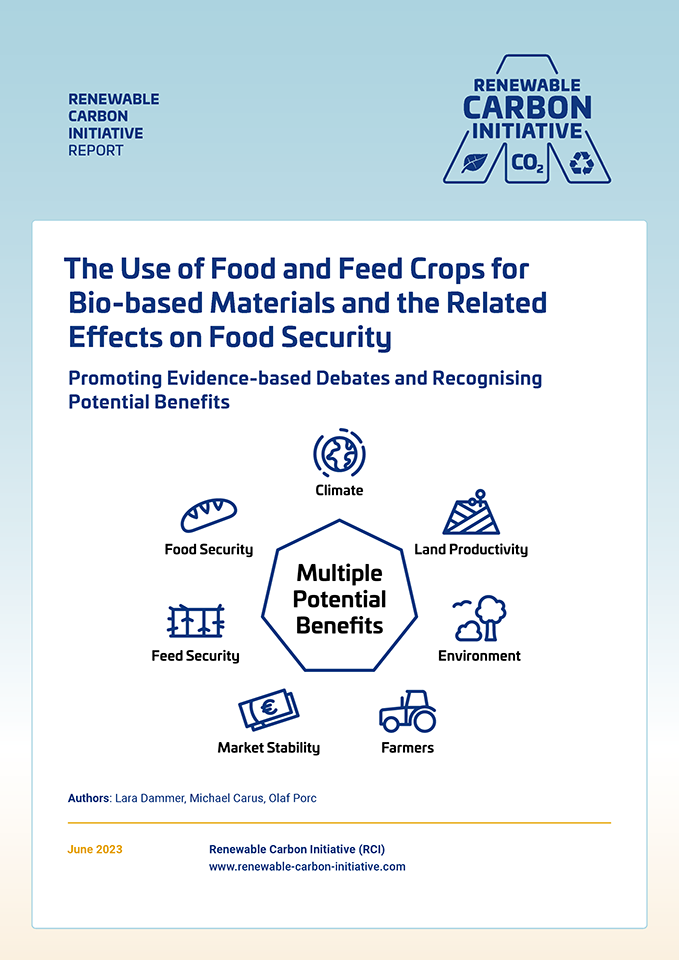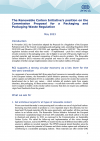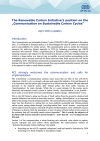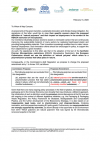Showing 1–20 of 29
-
RCI’s Internal Survey: „How to enable the transition from fossil to renewable carbon in the chemical and material sector“ (January 2024)
NewPolicy, Sustainability & Health
3 Pages
280 Downloads
280 Downloads
2024-01
FREE
280
DownloadsIn a comprehensive member survey in summer 2023, the Renewable Carbon Initiative (RCI) has collected ideas and opinions on what is needed to enable the transition from fossil to renewable carbon in Europe. The feedback paints a clear picture and is a call to action.
The European chemicals and materials sector is under pressure. RCI members, representing a wide range of these sectors, see many common elements in the key challenges and how to address them. High energy and raw material prices, as well as the need to defossilise carbon demand to meet CO2 emission targets, particularly in so-called “Scope 3” emissions, are some of the issues frequently raised.
-
RCI’s scientific background report: “Non-level playing field for renewable materials vs. fossil in Life Cycle Assessments – Critical aspects of the JRC Plastics LCA Methodology and its policy implications” (January 2024)
NewPolicy, Sustainability & Health
44 Pages
864 Downloads
864 Downloads
2024-01
FREE
864
DownloadsCritical aspects of the JRC Plastics LCA methodology and its policy implications
This RCI Scientific Background Report was mainly motivated by a study published by JRC in 2021 with the title: “LCA of alternative feedstocks for plastic products”, commonly referred to as the JRC Plastics LCA Method (Nessi et al. 2021).
Alternative feedstocks refer to the same three feedstocks that RCI defines as renewable carbon: biomass, CO2 utilisation and recycling. The study describes a methodology developed by the JRC to compare the environmental performance of alternative feedstocks with fossil-based plastic products. However, the methodology has also been subject to criticism from various stakeholders, mainly from the bio-based sector, eliciting responses from the JRC.
This RCI report is mainly aiming to provide additional context to highlight issues that might arise with implementation of the JRC Plastics LCA methodology, and dives deeper into five aspects:
- The fossil footprint is likely underestimated, not transparent and lacks regional differentiation
- Renewable feedstocks are more cirtically evaluated than fossil feedstocks
- Methodological inconsistency and different regulatory support between energy and material use of renewable feedstocks
- Biogenic/Atmospheric carbon uptake cannot be transparently visualised at factory in PEF / JRC Plastics LCA methodologies
- The methodology should acknowledge the wider interface of sustainability assessment, policy design and landscape
The report contains several recommendations to remedy the above-mentioned aspects.
-
RCI’s scientific background report: “Case studies based on peer-reviewed Life Cycle Assessments – Carbon footprints of different carbon-based chemicals and materials” (November 2023)
NewSustainability & Health
39 Pages
1352 Downloads
1352 Downloads
2023-11
FREE
1352
DownloadsIn this brochure, the RCI (https://renewable-carbon-initiative.com) presents five peer-reviewed LCA case studies – representing the highest possible scientific standard – that examine the carbon footprint of materials and products made from renewable carbon. These case studies are on products from RCI member companies Avantium (NL), BASF (DE), IFF (US), Lenzing (AT), Neste (FI) and all LCAs have been peer-reviewed by external experts. The LCAs have been summarised by experts of nova-Institutes sustainability team.
The case studies visualise that there are not only competitive materials and products made of renewable carbon already on the market, but that they also come with significantly lower carbon footprints ranging from 30–90%.
A key aspect of replacing fossil carbon with renewable carbon is the gained circularity of carbon. The less additional fossil carbon is added to our above-ground cycle of atmosphere, biosphere and technosphere, the smaller will be the amount of carbon emissions that have to be balanced out with expensive atmospheric removal and underground storage of carbon.
It is essential to recognise that the carbon footprint of renewable carbon-based materials is not automatically close to zero for two primary reasons:
- Fossil energy in the value chain
- Ongoing innovation and optimisation
All in all, the here presented materials and products show reduced carbon footprints already today, which lowers the remaining emissions gap so that less CO2 needs to be removed from the atmosphere in the future. At the same time, these materials and products still have significant potential to further reduce emissions in the future.
-
Renewable Carbon Initiative (RCI) Webinar slides – February 2024 (PDF)
Policy, Sustainability & Health
61 Pages
1339 Downloads
1339 Downloads
2024-02
FREE
Free Shipping1339
DownloadsThis document contains a generic set of slides to introduce the concept of renewable carbon and the Renewable Carbon Initiative. The focus of this webinar was the latest scientific background report: “Non-level Playing Field for Renewable Materials vs. Fossil in Life Cycle Assessments – Critical aspects of the JRC Plastics LCA methodology and its policy implications”.
In addition, three RCI member companies shared their expertise on renewable carbon, defossilisation and sustainable carbon cycles.
AllocNow (speaker: Daniel Bochnitschek) talked about how the increasing demand for sustainable and low carbon products is driving the need for specific and comprehensive information on product carbon footprints. AllocNow discussed why standardisation of sustainability accounting methodologies is critical and how a data-driven approach can help create transparency at scale.
Econic Technologies Ltd. (speaker: Liz Manning) spoke about the opportunities and challenges of quantifying the sustainability impact of key products in complex manufacturing supply chains.
SCS Global Services (speakers: Miguel Ruiz and Jéssica Marcon Bressanin) highlighted its certification activities, focusing on biofuels and circular materials schemes, as well as greenhouse gas accounting methodologies.
More information at https://renewable-carbon-initiative.com/media/library
-
830 Downloads
2024-01
FREE
830
Downloads -
Nora and her flyphone on renewable carbon (Comic)
Policy, Sustainability & Health
2 Pages
448 Downloads
448 Downloads
2024-01
FREE
448
Downloads -
RCI’s scientific background report: “The use of food and feed crops for bio-based materials and the related effects on food security – Promoting evidence-based debates and recognising potential benefits” (June 2023) Short Version
Markets & Economy, Policy, Sustainability & Health, Technology
2 Pages
542 Downloads
542 Downloads
2023-11
FREE
542
DownloadsPromoting Evidence-based Debates and Recognising Potential Benefits
This short version of the scientific paper highlights on two pages new insights into a hotly debated topic and urges for careful and evidence-based debates.
The paper aims to show that the well-known biomass debate is flawed, subjective and not fully based on evidence. What is detrimental to food security are, according to the World Food Programme in 2023, climate change, conflict, extreme inequalities in wealth distribution, heavy dependence on food imports from industrial countries, overconsumption of meat, losses along the value chain and the impact of the COVID pandemic. Competition between biomass uses is not mentioned among the relevant causes.
The use of biomass for industrial applications, does have the potential to replace fossil feedstocks and thus contribute to the urgently needed reduction of fossil carbon emissions into our atmosphere to mitigate climate change.
While not denying the dire need to combat world hunger, the authors of the paper argue that using food and feed crops for chemicals and materials will not necessarily exacerbate food insecurity, and in fact has the potential to cause multiple benefits for local and global food security, climate mitigation and other factors:
- The climate wins – Bio-based materials are part of the solution to achieve climate change mitigation.
- Land productivity wins – The competition between applications is not for the type of crop grown, but for the land.
- The environment wins – due to increased resource efficiency and productivity of food and feed crops.
- Farmers win – because they have more options for selling stock to different markets.
- Market stability wins – due to increased global availability of food and feed crops.
- Feed security wins – due to the high value of the protein-rich co-products of food and feed crops.
- Food security wins – due to the increased overall availability of edible crops that can be stored and flexibly distributed.
-
288 Downloads
2023-10
FREE
288
DownloadsThis position paper describes that our understanding that new thinking and terminology are required to achieve climate targets and secure a sustainable carbon supply
Comprehensive carbon management goes beyond CO2 emissions, capture and long-term storage, to which it is often reduced to. It decouples the whole industry from fossil feedstock, eliminates the use of fossil carbon wherever possible and allocates renewable carbon (from biomass, CO2 and recycling) as efficiently and effectively as possible where carbon use is unavoidable. The aim is to achieve the lowest possible CO2 emissions, reducing the need for Carbon Dioxide Removal to achieve net zero, and to provide a secure supply of renewable carbon to all dependent industries such as chemicals and materials. Only when carbon is recognised as a raw material in carbon management strategies can truly sustainable carbon cycles be achieved. With a proper comprehensive carbon management, the carbon-reliant material and energy sectors will be defossilised and the remaining energy sector will be decarbonised. And only for the remaining share of truly unavoidable emissions, carbon dioxide removal and carbon capture and storage should come into play.
-
Joint Letter: Carbon Capture and Utilisation (CCU) should be recognised as a Strategic Net Zero Technology in the EU Net Zero Industry Act (PDF)
Policy
2 Pages
42 Downloads
42 Downloads
2023-10
FREE
42
DownloadsA co-signed letter with CO2 Value Europe, Cefic – European Chemical Industry Council, the European Cement Association (CEMBUREAU), The Confederation of European Waste-to-Energy Plants (CEWEP), UPEI – the Voice of Europe’s Independent Fuel Suppliers, eFuel Alliance, Eurogas, The European Steel Association (EUROFER), FuelsEurope, Methanol Institute and the European Confederation of Fuel Distributors (ECFD) that calls on Members of the EU Parliament and EU Member States to take position to include CCU technologies as part – along with CCS – of the list of strategic net-zero technologies in the Net Zero Industry Act (NZIA).
-
RCI’s scientific background report: “RCI carbon flows report – Compilation of supply and demand of fossil and renewable carbon on a global and European level” (Oct. 2023)
Policy, Sustainability & Health
92 Pages
2110 Downloads
2110 Downloads
2023-10
FREE
2110
DownloadsThe Carbon Flows report is a compilation of supply and demand of fossil and renewable carbon on a global and European level. It provides a comprehensive understanding of today’s carbon flows and what it means to replace fossil carbon with renewable carbon in the materials and chemicals sectors. It’s main intent is to provide a uniform and transparent data basis for a future carbon management that can be used and shared by industry, associations, policy-makers, science and alike.
In the last five years, the mindset around carbon has changed fundamentally. Of course, there is no way around the fact that the rising concentration of carbon dioxide in the atmosphere pose an existential threat to life on Earth. But at the same time, carbon is the main component of our food, the basis of all organic chemicals and plastics, and the backbone of life on Earth.
In the chemicals and plastics sectors in particular, almost 90% of the carbon used as feedstock is fossil carbon. This fossil carbon must be replaced by renewable carbon from recycling, biomass and CO2 by 2050 to avoid a further influx of fossil carbon into our technosphere and atmosphere.This report provides a comprehensive, detailed and updated carbon flow data basis that significantly surpasses previous publications, containing more than 35 figures and tables with corresponding descriptions of methodology, source material and data. All data have been corroborated as best as currently possible by scientific publications, feedback from experts and additional research. Remaining gaps and differences are transparently depicted and explained as well as possible.
The nova experts assessed data from a multitude of sources. A wide range of data on material flow are used to compile a comprehensive inventory of carbon stocks and flows. The sectors covered include all applications of organic carbon from fossil resources and biomass production, from raw materials through utilisation to final end-of-life. This includes use of carbon for feed and food, for materials, for energy and for fuels. A special focus is put on the carbon demand in the chemical and plastic industry today and tomorrow, with several figures specifically zooming into this sector and including scenarios for a full defossilisation by 2050.
The Carbon Flows report is designed to be a living document that we would like to update every one to two years if possible. This also means that we look forward to your feedback, additional input, new data and suggestions from any interested party. Please directly contact the main author of the study for this: ferdinand.kaehler@nova-institut.de
DOI No.: https://doi.org/10.52548/KCTT1279
-
RCI’s scientific background report: “Renewable carbon as a guiding principle for sustainable carbon cycles (Update)” (September 2023)
Policy, Sustainability & Health
51 Pages
772 Downloads
772 Downloads
2023-09
FREE
772
DownloadsWhy It Is Right and Necessary To Choose Renewable Carbon as a Guiding Principle for Sustainable Development in the Chemicals and Materials Sectors
The Scientific Background Report on “Renewable Carbon as a Guiding Principle for Sustainable Carbon Cycles – Why It Is Right and Necessary To Choose Renewable Carbon as a Guiding Principle for Sustainable Development in the Chemicals and Materials Sectors“ was RCI’s first major publication and forms the basis for the concept and strategy of the RCI. Together with input from all members, the RCI has worked on an updated version – In this second edition, the following main changes have been implemented:
- New IPCC data on greenhouse gas emissions from the 6th Assessment Report (published March 2022) have been integrated.
- To establish proper data baselines, entirely novel carbon flows data have been integrated.
- The initial eleven policy recommendations were further sharpened, fine-tuned and concretised through lots of feedback from talks with politicians, NGOs, industrial actors, the bio-based, CO2-based and recycling sector, energy experts and many other stakeholders. Further political demands resulted from these discussions as well as recently published RCI position papers and consultations, which are now also integrated into the paper.
To reduce greenhouse gas emissions and mitigate climate change, the inflow of fossil carbon must be reduced quickly and in high volumes. The EU has started pushing for decarbonisation in energy and transport sectors, but has largely ignored chemical and material industries. These sectors require carbon-based feedstocks and cannot be “decarbonised,” so tackling embedded carbon in these industries is crucial. This paper proposes an approach to minimize environmental impact and maximize the reduction of GHG emissions.
DOI No.: https://doi.org/10.52548/CXFS7519
-
RCI’s position paper: “Commission proposal for a Green Claims Directive (GCD) – Towards science-based substantiation of claims and accurate biogenic carbon accounting” (September 2023)
Policy
3 Pages
129 Downloads
129 Downloads
2023-09
FREE
129
DownloadsTowards science-based substantiation of claims and accurate biogenic carbon accounting
The Renewable Carbon Initiative (RCI) wholeheartedly endorses the Green Claims Directive’s (GCD) mission to provide consumers and businesses with reliable, comparable, and verifiable information to facilitate sustainable choices.
In our position paper, we emphasise three aspects that, in our view, require additional attention to maximise the impact of the GCD and support products and solutions derived from non-fossil, renewable-carbon-based feedstock from biomass, CCU or recycling.
1. Science-Based Life-Cycle Assessment Methodologies: RCI welcomes the acceptance of several life-cycle assessment methods for substantiating environmental claims but emphasises the practical importance of maintaining flexibility in the upcoming trilogue negotiations. We also call for clarification on how to determine if an environmental impact is considered “significant.”
2. Differentiated Biogenic Carbon Accounting Methodology: The RCI advocates for enabling the possibility to better reflect uptake of atmospheric CO2 via biogenic carbon (and principally any process that captures CO2 from the atmosphere) in product assessments. In general, biogenic carbon in LCA is neither credited with carbon uptake through biomass at the beginning nor with the emissions (e.g. from incineration) at end of life. While this is from a proper LCA point-of-view valid and recommended, it leads to issues for stakeholders reporting their biogenic product’s carbon footprint at factory gate, because the uptake of atmospheric carbon cannot be shown and the conceptual advantage over fossil products gets lost. At the same time, we are aware of misleading “carbon negative” claims and argue that only full cradle-to-grave LCAs should qualify for such B2C claims.
3. Ensuring a Reliable Verification Mechanism: Recognising the need for mandated verification of environmental claims before B2C communication, RCI acknowledges the potential challenges posed by these resource-intensive processes. We want to stress the importance of an effective approach and an extended transition period to enable authorities, verifiers, and the industry to smoothly adapt to these processes and mitigate potential delays in communicating claims for innovative products.
tation. -
RCI’s position paper: “RCI’s manifesto for the next European Commission (2024-2029)” (August 2023)
Policy
3 Pages
208 Downloads
208 Downloads
2023-08
FREE
208
DownloadsThe RCI Manifesto highlights key issues for the new European Commission (2024 – 2029) to take up and focus on.
The key messages are:
- Ensure that carbon embedded in chemicals and materials is given more political attention as an important factor for material-related emissions. Renewable carbon derived from biomass, direct CO2 utilisation, and recycling must become a guiding principle for policies and targets regulating chemicals and materials.
- Make a stepwise phaseout of fossil carbon from below the ground for chemicals and materials by 2050 an explicit objective.
- Translate the 20% non-fossil carbon target for chemicals and plastics by 2030 from the Sustainable Carbon Cycles Communication into binding legislation and ensure implementation through concrete policy measures.
- Establish a ‘Carbon Management Regulation’ to incentivise companies to replace fossil carbon from below the ground with renewable alternatives.
- Promote bio- and CO2-based[1] or -attributed content in parallel to recycled content in product-related regulation.
- Deploy Carbon Capture and Utilisation (CCU) as a key strategic net-zero technology to provide sustainable and circular carbon.
- Support the transformation of existing chemical infrastructure from fossil to renewable carbon and support the transformation of biofuels plants into chemical suppliers without discriminating against existing production from renewable feedstock (including primary biomass).
[1] The use of the term CCU generally refers to the utilisation of carbon dioxide (CO2), but can also include industrial carbon monoxide (CO) sources prior to flaring or other conversions to CO2 before release to the atmosphere. In the US, CO2 and CO are grouped together as “carbon oxides” for purposes of Section 45Q CCUS tax credits. In this report, “CO2 utilisation” is meant to also include other carbon oxides.
Call for Signature
The RCI manifesto outlines 7 core recommendations directed towards the forthcoming European Commission, aimed at translating the vision of ending the use of fossil feedstock into reality.
Voice your support for the RCI manifesto for the next European Commission (2024–2029) now!
-
Renewable Carbon Initiative (RCI) Shapes the Future of the Chemicals and Materials Sector
Markets & Economy, Policy
3 Pages
115 Downloads
115 Downloads
2023-07
FREE
Free Shipping115
DownloadsFrom international brands to leading chemical and bioeconomy companies to innovative start-ups for CO2 utilisation, companies are collaborating to guide a smart transition from fossil carbon to renewable carbon. The Renewable Carbon Initiative (RCI) (www.renewable-carbon-initiative.com) was created after observing the struggles of the chemical and material industriesin facing the enormous challenges to meet the climate goals set by the European Union and the sustainability expectations held by societies around the globe. It was clear that the industry has to go beyond using renewable energy and also consider their raw materials. Because decarbonisation is not an option for the chemical and material sector, as it is entirely based on the use of carbon, an alternative strategy is required: defossilisation through renewable carbon – carbon from above the ground: biomass, CO2 and recycling.
-
RCI’s scientific background paper: “Making a case for Carbon Capture and Utilisation (CCU) – It is much more than just a carbon removal technology” (July 2023)
Markets & Economy, Policy, Sustainability & Health, Technology
48 Pages
1477 Downloads
1477 Downloads
2023-07
FREE
Free Shipping1477
DownloadsThis scientific background paper highlights the importance of Carbon Capture and Utilisation (CCU) and the need for more political recoginition and support for CCU.
CCU enables the substitution of fossil carbon in sectors where carbon is necessary, supports the full defossilisation of the chemical and derived material industries, creates a circular economy, reduces the emission gap, promotes sustainable carbon cycles, fosters innovation, generates local value and stimulates job growth.
CCU is much more than a carbon removal technology: the technology offers multiple solutions to pressing problems of our modern world and can support several Sustainable Development Goals if implemented properly.
In total, 14 different benefits and advantages of CCU are described and discussed in the paper. A key advantage is that CCU supplies renewable carbon to – and thereby substitutes fossil carbon in – sectors that will require carbon in the long run. This includes the chemical sectors and products like polymers, plastics, solvents, paints, detergents, cosmetics or pharmaceuticals. But CCU is also essential to a long-term net-zero strategy, crucial for creating a sustainable circular economy, providing solutions for scaling up the renewable energy system, and bringing multiple benefits for innovation and business.
The relevance of the technology is not yet accepted in Europe, but the RCI wants to make a very clear statement: CCU is a central pillar for the biggest transformation of the chemical and material industry since the industrial revolution.
DOI No.: https://doi.org/10.52548/VYKR3129
-
157 Downloads
2023-07
FREE
157
DownloadsThis short document contains seven key policy messages the RCI advocates for to shape the future of the chemical and material industry. These seven messages are:
- Renewable carbon and comprehensive carbon management need to become integral guiding principles of policies to achieve truly sustainable carbon cycles.
- Adopt a precise definition of “non-fossil, sustainable” carbon and then adopt a legally binding target for 20% sustainable, non-virgin-fossil carbon content
- Suitable measures to support the 20% goal would be
- material- and product focused policies that promote all three renewable carbon sources,
- CCU receiving at least the same support as CCS and
- recognition and promotion of chemical recycling technologies
- Support the transformation of existing chemical infrastructure from fossil to renewable carbon and support the transformation of biofuels plants into chemical suppliers
- Support the massive expansion of renewable energies
- Develop standards, certificates and labels for renewable carbon
- Phase out financial support, tax advantages and tax exemptions for fossil feedstocks
-
RCI’s scientific background report: “The use of food and feed crops for bio-based materials and the related effects on food security – Promoting evidence-based debates and recognising potential benefits” (June 2023) Long Version
Markets & Economy, Policy, Sustainability & Health, Technology
36 Pages
1138 Downloads
1138 Downloads
2023-06
FREE
1138
DownloadsPromoting Evidence-based Debates and Recognising Potential Benefits
This scientific paper highlights new insights into a hotly debated topic and urges for careful and evidence-based debates.
The paper aims to show that the well-known biomass debate is flawed, subjective and not fully based on evidence. What is detrimental to food security are, according to the World Food Programme in 2023, climate change, conflict, extreme inequalities in wealth distribution, heavy dependence on food imports from industrial countries, overconsumption of meat, losses along the value chain and the impact of the COVID pandemic. Competition between biomass uses is not mentioned among the relevant causes.
The use of biomass for industrial applications, does have the potential to replace fossil feedstocks and thus contribute to the urgently needed reduction of fossil carbon emissions into our atmosphere to mitigate climate change.
While not denying the dire need to combat world hunger, the authors of the paper argue that using food and feed crops for chemicals and materials will not necessarily exacerbate food insecurity, and in fact has the potential to cause multiple benefits for local and global food security, climate mitigation and other factors:
- The climate wins – Bio-based materials are part of the solution to achieve climate change mitigation.
- Land productivity wins – The competition between applications is not for the type of crop grown, but for the land.
- The environment wins – due to increased resource efficiency and productivity of food and feed crops.
- Farmers win – because they have more options for selling stock to different markets.
- Market stability wins – due to increased global availability of food and feed crops.
- Feed security wins – due to the high value of the protein-rich co-products of food and feed crops.
- Food security wins – due to the increased overall availability of edible crops that can be stored and flexibly distributed.
DOI No.: https://doi.org/10.52548/WQXU7327
-
RCI’s position paper: “Commission proposal for a Packaging and Packaging Waste Regulation” (May 2023)
Policy
3 Pages
257 Downloads
257 Downloads
2023-05
FREE
257
DownloadsThis position paper highlights chances for the EU to lead the way to a sustainable packaging industry and to promote innovation
In November 2022, the Commission adopted the Proposal for a Regulation of the European Parliament and of the Council on packaging and packaging waste, amending Regulation (EU) 2019/1020 and Directive (EU) 2019/904, and repealing Directive 94/62/EC. The proposed regulation includes several rules that would – if implemented – push for a much stronger circular economy in the packaging sector, due to higher re-use and refill quotas, higher use of recycled materials and mandatory composting of certain hard-to-recycle products.
The Renewable Carbon Initiative (RCI) welcomes this proposal and wants to offer several suggestions to strengthen it further and get implementation closer to the market realities of Europe.
1. Set ambitious targets for all types of renewable content:
A complementary renewable content target should be added to the proposal promoting the use of bio- and CO2-based feedstocks in packaging similar to recycling.2. Keep Article 8 as it is – scientific evidence shows that these products offer true environmental benefits from being compostable
The proposal, following scientific evidence, requires that certain types of tea and coffee packaging, sticky labels attached to fruit and vegetables as well as very lightweight plastic carrier bags shall be compostable in industrially controlled conditions in bio-waste treatment facilities.3. Support the market uptake of all state-of-the-art recycling technologies
To actually achieve the ambitious recycling quotas and recycled content targets, technologies will have to evolve. Advanced recycling technologies (i.e. depolymerisation) are key. -
RCI’s position paper: “Communication on sustainable carbon cycles” (April 2023)
Policy
7 Pages
510 Downloads
510 Downloads
2023-04
FREE
Free Shipping510
DownloadsThe RCI, an interest group of leading companies and pioneers from the chemical and material sector, has a rich history of advocating for policies acknowledging the indispensable need of carbon in a broad range of chemical and material industries. The Communication on Sustainable Carbon Cycles, as published in December 2021, is a milestone in European policy as it acknowledges exactly this value of carbon as a feedstock and its unavoidability for certain sectors. The recently published position paper of the RCI highlights why this is an important step in the right direction and asks policy makers for effective follow-up.
-
Letter to the Commission on the definition of natural polymers in the REACH microplastics restriction
Policy, Sustainability & Health
4 Pages
360 Downloads
360 Downloads
2023-02
FREE
360
DownloadsSix leading associations and stakeholders from the chemicals, polymers and plastics sectors – namely BioChem Europe (a sector group of Cefic), EDANA, EuropaBio, European BioPlastics, GO!PHA and Renewable Carbon Initiative) – express in this letter their specific concerns about the proposed definition of “natural polymers” and its impact on biopolymers in the context of the REACH restriction on microplastics.
Under the coordination of the Renewable Carbon Initiative (RCI) they ask the European Commission in a letter “that in the adoption of the text of the Synthetic Polymer Microparticles restrictions (REACH Microplastics Restriction), the European Commission should not use the definition of ‘natural polymer’ which refers to a polymerisation process that takes place in nature.“



